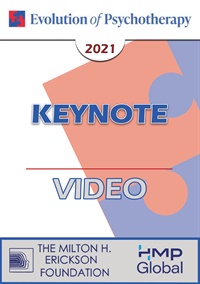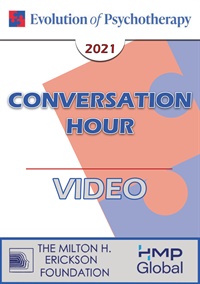- Average Rating:
- Not yet rated
- Topic Areas:
- Dialogues | Communication | Relationships | Resistance
- Categories:
- Anxiety and Depression Conference 2024
- Faculty:
- David Burns, MD | Lilian Borges, MA, LPC
- Course Levels:
- Master Degree or Higher in Health-Related Field
- Duration:
- 1:00:51
- Format:
- Audio and Video
- Original Program Date:
- Sep 15, 2024
- Short Description:
- Resolving conflict does not always require both people to be in the room. In this thoughtful dialogue, David Burns shows how TEAM CBT can be used in individual therapy to address blame, resistance, and stuck interpersonal patterns, using structured tools like the E-A-R checklist and the Five Secrets of communication. Lillian Borges adds an attachment-informed perspective, exploring pursuer-withdrawer dynamics, secure functioning, and practical ways to reduce escalation and restore emotional safety.
- Price:
- $59.00 - Base Price
- Average Rating:
- Not yet rated
- Topic Areas:
- Keynotes | Anxiety | Cognitive Behavior Therapy (CBT)
- Categories:
- Anxiety and Depression Conference 2024
- Faculty:
- Reid Wilson, PhD
- Course Levels:
- Master Degree or Higher in Health-Related Field
- Duration:
- 1:00:51
- Format:
- Audio and Video
- Original Program Date:
- Sep 15, 2024
- Short Description:
- This session focuses on treating generalized anxiety disorder through a unifying framework for anxiety disorders. Key concepts include distinguishing “signal” from “noise” worries and breaking the cycle where worry suppresses physical activation. Emphasis is placed on shifting mindset, accepting uncertainty, and using proactive behavioral strategies to reduce anxiety’s hold and build long-term resilience.
- Price:
- $59.00 - Base Price
- Average Rating:
- Not yet rated
- Topic Areas:
- Workshops | Depression | Experiential Therapy | Hypnosis
- Categories:
- Anxiety and Depression Conference 2024
- Faculty:
- Michael Yapko, PhD
- Course Levels:
- Master Degree or Higher in Health-Related Field
- Duration:
- 1:55:45
- Format:
- Audio and Video
- Original Program Date:
- Sep 14, 2024
- Short Description:
- This workshop illustrates how hypnosis empowers depressed clients by teaching skills rather than prescribing labels or pills. Yapko shows how trance fosters expectancy, resilience, and self-discovery, offering a powerful antidote to rumination and helplessness. Participants learn how hypnosis provides a flexible, experiential context for change, helping clients reframe their history and embrace new possibilities.
- Price:
- $59.00 - Base Price
- Average Rating:
- Not yet rated
- Topic Areas:
- Workshops | Couples Therapy | Relational Life Therapy Model (RLT)
- Bundle(s):
- 2024 Couples Conference Bundle
- Categories:
- Couples Conference | Couples Conference 2024 | Pioneers in Couples and Family Therapy
- Faculty:
- Terry Real, LICSW
- Course Levels:
- Master Degree or Higher in Health-Related Field
- Duration:
- 2:00:54
- Format:
- Audio and Video
- Original Program Date:
- May 04, 2024
- Short Description:
- This workshop outlines the core phases of Relational Life Therapy (RLT): data gathering, confronting power imbalances, and teaching relational skills. It emphasizes the role of the adaptive child, relational mindfulness, and moving from complaint to request. Key topics include managing grandiosity and shame, fostering maturity, setting boundaries, practicing loving power, and cultivating relational joy. Strategies for addressing defensiveness, narcissism, and behavior change are also presented.
- Price:
- $59.00 - Base Price
- Average Rating:
- Not yet rated
- Topic Areas:
- Workshops | Couples Therapy | Ethical Practice | Therapist Development
- Bundle(s):
- 2024 Couples Conference Bundle
- Categories:
- Couples Conference | Couples Conference 2024 | Pioneers in Couples and Family Therapy
- Faculty:
- William Doherty, PhD
- Course Levels:
- Master Degree or Higher in Health-Related Field
- Duration:
- 1:47:03
- Format:
- Audio and Video
- Original Program Date:
- May 04, 2024
- Short Description:
- Although nowadays we have great models of couple therapy, therapists can become pessimistic in working with difficult couples—and inadvertently send messages that undermine their relationships. Based on a new research study with clients who have been in couple therapy, this presentation will describe things to generally avoid saying to couples about their relationship and its prospects for repair. The workshop will offer a mindset for staying positive with couples and a set of skills for handling therapeutic impasses without resorting to making comments that undermine the therapy and the couple relationship.
- Price:
- $59.00 - Base Price
- Average Rating:
- Not yet rated
- Topic Areas:
- Topical Panels | Clinical Process | Couples Therapy
- Bundle(s):
- 2024 Couples Conference Bundle
- Categories:
- Couples Conference | Couples Conference 2024 | Pioneers in Couples and Family Therapy
- Faculty:
- Terry Real, LICSW | Elliott Connie, MA, LPC | William Doherty, PhD
- Course Levels:
- Master Degree or Higher in Health-Related Field
- Duration:
- 59:19
- Format:
- Audio and Video
- Original Program Date:
- May 04, 2024
- Short Description:
- This workshop focuses on managing the first couples therapy session—often the most critical. It covers how to establish a working alliance with partners who may be ambivalent, reactive, or have conflicting goals. Key strategies include assertive leadership, empathic engagement, and structured techniques like discernment counseling. Topics include assessing prior therapy, clarifying desired outcomes, and identifying the couple’s relational patterns to set the stage for effective, goal-oriented work.
- Price:
- $59.00 - Base Price
- Average Rating:
- Not yet rated
- Topic Areas:
- Keynotes | Couples Therapy | Ethical Practice | Therapist Development
- Bundle(s):
- 2024 Couples Conference Bundle
- Categories:
- Couples Conference | Couples Conference 2024 | Pioneers in Couples and Family Therapy
- Faculty:
- William Doherty, PhD
- Course Levels:
- Master Degree or Higher in Health-Related Field
- Duration:
- 57:54
- Format:
- Audio and Video
- Original Program Date:
- May 04, 2024
- Short Description:
- Therapists experience the same relationship issues we see in our offices. Although our clinical training may give us more access to our inner emotional lives than many people, we face “occupational hazards,” such as a tendency to read our partner’s mind and then explain it to them. With humility and humor, let’s explore the relational self of the therapist and how we sometimes show up in couple therapy. In this workshop, we’ll learn how to how to help fellow therapists when they come as clients to leverage their personal and professional strengths to have healthier relationships—and avoid blind spots that come with the territory.
- Price:
- $59.00 - Base Price
- Average Rating:
- Not yet rated
- Topic Areas:
- Workshops | Psychobiological Approach to Couples Therapy (PACT) | Couples Therapy
- Bundle(s):
- 2024 Couples Conference Bundle
- Categories:
- Couples Conference | Couples Conference 2024 | Pioneers in Couples and Family Therapy
- Faculty:
- Stan Tatkin, PsyD, MFT
- Course Levels:
- Master Degree or Higher in Health-Related Field
- Duration:
- 2:08:22
- Format:
- Audio and Video
- Original Program Date:
- May 03, 2024
- Short Description:
- This workshop examines acting out as a breakdown in therapeutic alliance. Tatkin emphasizes confronting the couple system—not individual partners—to restore collaboration and keep therapy on track. Using techniques like supportive confrontation and the crossing method, therapists learn to address blame, misdirection, and dysregulation with less effort and greater strategic impact.
- Price:
- $59.00 - Base Price
- Average Rating:
- Not yet rated
- Topic Areas:
- Workshops | Couples Therapy | Relational Life Therapy Model (RLT)
- Bundle(s):
- 2024 Couples Conference Bundle
- Categories:
- Couples Conference | Couples Conference 2024 | Pioneers in Couples and Family Therapy
- Faculty:
- Terry Real, LICSW
- Course Levels:
- Master Degree or Higher in Health-Related Field
- Duration:
- 1:30:25
- Format:
- Audio and Video
- Original Program Date:
- May 03, 2024
- Short Description:
- This presentation introduces Relational Life Therapy (RLT), a three-phase approach centered on awakening clients, confronting truth with compassion, and engaging in deep trauma work. It addresses power imbalances in couples by identifying “blatant” and “latent” roles, and emphasizes forming therapeutic alliances with clients’ wise adult selves. Key themes include relational mindfulness, empathy, managing grandiosity, and promoting systemic change for lasting relational transformation.
- Price:
- $59.00 - Base Price
- Average Rating:
- Not yet rated
- Topic Areas:
- Keynotes | Psychobiological Approach to Couples Therapy (PACT) | Transference Focused Psychotherapy (TFP) | Trauma Studies
- Bundle(s):
- 2024 Couples Conference Bundle
- Categories:
- Couples Conference | Couples Conference 2024 | Pioneers in Couples and Family Therapy
- Faculty:
- Stan Tatkin, PsyD, MFT
- Course Levels:
- Master Degree or Higher in Health-Related Field
- Duration:
- 1:05:04
- Format:
- Audio and Video
- Original Program Date:
- May 03, 2024
- Short Description:
- Exploring what sustains long-term romantic partnerships, this keynote reframes love as insufficient without shared vision, purpose, and principles of governance. Tatkin outlines how secure-functioning couples reduce threat, foster co-regulation, and build enduring bonds by operating as collaborative, fair, and organized systems grounded in mutual responsibility.
- Price:
- $59.00 - Base Price
- Average Rating:
- Not yet rated
- Topic Areas:
- Keynotes | Couples Therapy | Relational Life Therapy Model (RLT) | Social Issues
- Bundle(s):
- 2024 Couples Conference Bundle
- Categories:
- Couples Conference | Couples Conference 2024 | Pioneers in Couples and Family Therapy
- Faculty:
- Terry Real, LICSW
- Course Levels:
- Master Degree or Higher in Health-Related Field
- Duration:
- 1:02:49
- Format:
- Audio and Video
- Original Program Date:
- May 03, 2024
- Short Description:
- This talk examines the global rise of patriarchy and its impact on intimate relationships, highlighting how anti-relational culture contributes to high failure rates in long-term partnerships. The speaker presents Relational Life Therapy (RLT) as a solution, built on three phases: loving confrontation, trauma work, and skill-building. Emphasizing the need to teach relational skills in schools, the approach addresses both individual challenges—like grandiosity and shame—and broader systemic influences to build healthier, more connected relationships.
- Price:
- $59.00 - Base Price
- Average Rating:
- Not yet rated
- Topic Areas:
- Keynotes | Attachment | Psychobiological Approach to Couples Therapy (PACT) | Stress
- Categories:
- Couples Conference | Couples Conference 2023 | Pioneers in Couples and Family Therapy
- Faculty:
- Stan Tatkin, PsyD, MFT
- Course Levels:
- Master Degree or Higher in Health-Related Field
- Duration:
- 57:10
- Format:
- Audio and Video
- Original Program Date:
- May 07, 2023
- Short Description:
- A keynote on PACT as a purpose-centered, psychobiological approach to primary attachment. Tatkin outlines secure functioning as a high-bar, team-based relational ethic grounded in fairness, mutuality, and collaboration. Drawing from attachment theory, neuroscience, and arousal regulation, he highlights how bottom-up, real-time assessment guides couples toward durable, principled connection.
- Price:
- $59.00 - Base Price
- Average Rating:
- Not yet rated
- Topic Areas:
- Workshops | Betrayal | Psychobiological Approach to Couples Therapy (PACT) | Trauma Studies
- Categories:
- Couples Conference | Couples Conference 2023 | Pioneers in Couples and Family Therapy
- Faculty:
- Stan Tatkin, PsyD, MFT
- Course Levels:
- Master Degree or Higher in Health-Related Field
- Duration:
- 2:12:51
- Format:
- Audio and Video
- Original Program Date:
- May 06, 2023
- Short Description:
- This workshop addresses the clinical architecture required to treat partner betrayal—especially when secrets, lies, and gaslighting lead to traumatic discovery. Using a psychobiological approach, Tatkin outlines strategies for stabilizing the discovery partner, confronting the secret keeper, and restoring secure functioning through structured, emotionally evocative interventions.
- Price:
- $59.00 - Base Price
- Average Rating:
- Not yet rated
- Topic Areas:
- Keynotes | Couples Therapy | Therapeutic Process | Therapy Practice
- Categories:
- Couples Conference | Couples Conference 2023 | Pioneers in Couples and Family Therapy
- Faculty:
- Stan Tatkin, PsyD, MFT | Elliott Connie, MA, LPC | Terry Real, LICSW
- Course Levels:
- Master Degree or Higher in Health-Related Field
- Duration:
- 57:58
- Format:
- Audio and Video
- Original Program Date:
- May 06, 2023
- Short Description:
- This panel addresses best practices for ending couples therapy, focusing on client autonomy, relational accountability, and therapist discretion. Approaches include assuming each session may be the last, using leverage to support change, and emphasizing secure-functioning relationships. Termination is considered appropriate in cases of safety concerns or client readiness, underscoring the value of a strong therapeutic alliance and lasting behavioral transformation.
- Price:
- $59.00 - Base Price
- Average Rating:
- Not yet rated
- Topic Areas:
- Keynotes | Intimacy | Relational Life Therapy Model (RLT)
- Categories:
- Couples Conference | Couples Conference 2023 | Pioneers in Couples and Family Therapy
- Faculty:
- Terry Real, LICSW
- Course Levels:
- Master Degree or Higher in Health-Related Field
- Duration:
- 40:45
- Format:
- Audio and Video
- Original Program Date:
- May 06, 2023
- Short Description:
- This keynote on Relational Life Therapy (RLT) focuses on intimacy, secure attachment, and the shift from individualism to relational living. It outlines three phases of RLT—waking up, joining through truth, and teaching skills—while addressing adaptive childhood patterns. Emphasis is placed on relational mindfulness, repair strategies, and helping clients think relationally to build stronger, more connected partnerships.
- Price:
- $59.00 - Base Price
- Average Rating:
- Not yet rated
- Topic Areas:
- Workshops | Relational Life Therapy Model (RLT) | Couples Therapy | Trauma
- Categories:
- Couples Conference | Couples Conference 2023 | Pioneers in Couples and Family Therapy
- Faculty:
- Terry Real, LICSW
- Course Levels:
- Master Degree or Higher in Health-Related Field
- Duration:
- 1:20:18
- Format:
- Audio and Video
- Original Program Date:
- May 05, 2023
- Short Description:
- This workshop presents Relational Life Therapy (RLT), a powerful couples therapy model that integrates deep individual work—such as trauma healing and character transformation—within the presence of a partner. Blending loving confrontation, relational skills training, and inner child work, RLT produces rapid, lasting change. Core concepts include addressing shame and grandiosity, using the wise adult/wounded child/adaptive child framework, and applying empathic reversal to build compassion, accountability, and authentic connection.
- Price:
- $59.00 - Base Price
- Average Rating:
- Not yet rated
- Topic Areas:
- Workshops | Masculinity | Relational Life Therapy Model (RLT) | Intimacy | Love
- Categories:
- Couples Conference | Couples Conference 2023 | Pioneers in Couples and Family Therapy
- Faculty:
- Terry Real, LICSW
- Course Levels:
- Master Degree or Higher in Health-Related Field
- Duration:
- 1:34:03
- Format:
- Audio and Video
- Original Program Date:
- May 05, 2023
- Short Description:
- This talk introduces key insights from "Us: Getting Past You and Me to Build a More Loving Relationship", focusing on the concept of “loving power”—a blend of assertiveness and cherishing. It examines how patriarchy and individualism contribute to relational trauma and offers strategies from Relational Life Therapy (RLT), including loving confrontation, trauma repair, and skill-building. Emphasis is placed on self-disclosure, humility, and cultivating authentic connection.
- Price:
- $59.00 - Base Price
- Average Rating:
- Not yet rated
- Topic Areas:
- Workshops | Assessment | Attachment | Psychobiological Approach to Couples Therapy (PACT)
- Categories:
- Couples Conference | Couples Conference 2023 | Pioneers in Couples and Family Therapy
- Faculty:
- Stan Tatkin, PsyD, MFT
- Course Levels:
- Master Degree or Higher in Health-Related Field
- Duration:
- 1:59:45
- Format:
- Audio and Video
- Original Program Date:
- May 05, 2023
- Short Description:
- This workshop presents secure functioning as the cornerstone of enduring couple relationships. Drawing on PACT’s psychobiological framework, Tatkin demonstrates how bottom-up techniques—like reenactments, visual tracking, and somatic attunement—help therapists shift partners toward mutual safety, co-regulation, and shared governance. Key clinical markers and real-time interventions clarify how to build load-bearing, resilient relational systems.
- Price:
- $59.00 - Base Price
- Average Rating:
- Not yet rated
- Topic Areas:
- Workshops | Couples Therapy | Therapist Development | Clinical Process
- Categories:
- Couples Conference | Couples Conference 2022 | Pioneers in Couples and Family Therapy
- Faculty:
- William Doherty, PhD
- Course Levels:
- Master Degree or Higher in Health-Related Field
- Duration:
- 1:56:38
- Format:
- Audio and Video
- Original Program Date:
- Jun 25, 2022
- Short Description:
- Most clinical conversations about couple relationship problems occur in individual therapy, not couples therapy. But individual therapy models offer little guidance for how to address relationship problems. The result is that therapists sometimes collude with their client’s view of the partner and offer one-sided narratives of complex relational problems. This doesn’t help the client and can undermine the relationship. Even couples therapists sometimes make the same mistakes when doing individual therapy. This workshop will provide specific tools and guidelines for helping individual clients in the context of their relationship, while avoiding common traps when we are seeing just one member of a couple.
- Price:
- $59.00 - Base Price
- Average Rating:
- Not yet rated
- Topic Areas:
- Keynotes | Attachment | Couples Therapy | Psychobiological Approach to Couples Therapy (PACT)
- Categories:
- Couples Conference | Pioneers in Couples and Family Therapy | Couples Conference 2022
- Faculty:
- Stan Tatkin, PsyD, MFT
- Course Levels:
- Master Degree or Higher in Health-Related Field
- Duration:
- 1:02:37
- Format:
- Audio and Video
- Original Program Date:
- Jun 25, 2022
- Short Description:
- This session explores the integration of the "empty chair" psychodrama within the PACT model to interrupt regressive relational patterns rooted in early object relations. By externalizing archaic self–other dynamics, therapists can help partners develop a witness state, promote individuation, and shift ego-syntonic behaviors toward more adaptive, secure-functioning interactions in real time.
- Price:
- $59.00 - Base Price
- Average Rating:
- Not yet rated
- Topic Areas:
- Workshops | Psychobiological Approach to Couples Therapy (PACT) | Psychodrama | Stress
- Categories:
- Couples Conference | Couples Conference 2022 | Pioneers in Couples and Family Therapy
- Faculty:
- Stan Tatkin, PsyD, MFT
- Course Levels:
- Master Degree or Higher in Health-Related Field
- Duration:
- 1:56:45
- Format:
- Audio and Video
- Original Program Date:
- Jun 24, 2022
- Short Description:
- Tatkin presents the use of structured “therapeutic containers”—exercises designed to elicit real-time couple dynamics and clarify treatment goals. These scenarios, often playful or stress-inducing, allow therapists to assess regulation, secure functioning, and communication. Grounded in PACT, this approach blends psychodrama, attachment theory, and strategic role-play to surface implicit behaviors and refine therapeutic direction.
- Price:
- $59.00 - Base Price
- Average Rating:
- Not yet rated
- Topic Areas:
- Keynotes | Therapeutic Relationship | Therapist Development | Couples Therapy
- Categories:
- Couples Conference | Couples Conference 2022 | Pioneers in Couples and Family Therapy
- Faculty:
- William Doherty, PhD
- Course Levels:
- Master Degree or Higher in Health-Related Field
- Duration:
- 57:40
- Format:
- Audio and Video
- Original Program Date:
- Jun 24, 2022
- Short Description:
- In this golden age for models of couples therapy, therapists may wonder if they should be practicing the “one best model.” The research is clear that couples therapy models that have been tested are about equally effective, and that there are a number of key ingredients in any effective way to practice couples therapy. The presenter will describe these key ingredients that cut across models and some skills necessary to practice any model. He will argue that since this therapy is about improving relationships, the relationships we establish with our couple clients—balanced, caring, and sometimes challenging—are the heart of what we have to do well.
- Price:
- $59.00 - Base Price
- Average Rating:
- Not yet rated
- Topic Areas:
- Topical Panels | Cognitive Psychology | Motivation | Neuro-Linguistic Programming (NLP) | Psychoanalysis | Resistance | Strategic Therapy
- Categories:
- Evolution of Psychotherapy | Evolution of Psychotherapy 2021 | Pioneers in Couples and Family Therapy
- Faculty:
- Robert Dilts, BA | Nancy McWilliams | Michael Miller | Cloe Madanes, HDL, LIC
- Course Levels:
- Master Degree or Higher in Health-Related Field
- Duration:
- 1 hour
- Format:
- Audio and Video
- Original Program Date:
- Dec 05, 2021
- Short Description:
- This panel explores diverse perspectives on resistance in therapy, featuring insights from leading experts. Dilts focuses on the relational aspect of resistance, while McWilliams draws from psychoanalytic theory to stress nonjudgmental responses. Miller explains how motivational interviewing reframes resistance as sustained talk and discord. Madanes offers a case study on using family dynamics to reduce resistance. The panel also addresses how COVID-19 has shaped client engagement and resistance in therapeutic settings.
- Price:
- $59.00 - Base Price
- Average Rating:
- Not yet rated
- Topic Areas:
- Keynotes | Therapist Development | Consciousness | Identity | Attachment
- Categories:
- Evolution of Psychotherapy | Evolution of Psychotherapy 2021
- Faculty:
- Diane Ackerman, MFA, PhD
- Course Levels:
- Master Degree or Higher in Health-Related Field
- Duration:
- 1 hour
- Format:
- Audio and Video
- Original Program Date:
- Dec 05, 2021
- Short Description:
- This keynote is a sweeping, poetic tour of what makes a self, blending neuroscience, evolution, memory, relationships and metaphor into a vivid portrait of human identity. Diane Ackerman explores how the brain constructs experience, how relationships shape our inner life, and how memory, emotion and imagination continually revise who we are. Participants are invited into a playful, profound meditation on consciousness, connection and the ever-changing mosaic of selves we carry through the world.
- Price:
- $59.00 - Base Price
- Average Rating:
- Not yet rated
- Topic Areas:
- Conversation Hours | Brief Therapy | Couples Therapy | Divorce | Relationships | Therapist Development
- Categories:
- Evolution of Psychotherapy | Evolution of Psychotherapy 2021 | Pioneers in Couples and Family Therapy
- Faculty:
- Michele Weiner-Davis, LCSW
- Course Levels:
- Master Degree or Higher in Health-Related Field
- Duration:
- 1 hour
- Format:
- Audio and Video
- Original Program Date:
- Dec 05, 2021
- Short Description:
- Michele Weiner-Davis shares what she’s learning from her latest work with couples facing infidelity and disconnection. She outlines a three-stage model for healing affairs, explores why desire discrepancies can quietly erode connection, and reflects on the shift toward longer, more immersive sessions. Grounded, hopeful, and highly practical, the session invites fresh thinking for therapists supporting couples on the brink.
- Price:
- $59.00 - Base Price


























